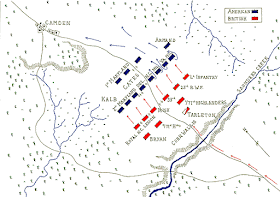We played Black Powder, using the 50% reduction suggestion for 15mm (basically, the game is identical, as it should be, but all distances are halved).
The game featured 3 commands on each side (for the planned 6 players), and each command controlled two brigades.
The scenario was a fictional fight based in late September, 1780, in South Carolina, and is based on the premise that the Americans won the Battle of Camden.
The thesis is this: First, the Southern Towns of the Cherokee Nation did not join the British against the Colonials, but remained neutral (so rather than being attacked by the SC Militia, they were harassed by the Carolina Loyalists).
 |
| Cherokee vs Soldiers: Imagine they had been British? |
 |
| Battle of Camden: Imagine if the Colonials hadn't run? |
Now, with the Cherokee's in the area being neutral, and leaning away from the British, and the Continentals having just won a large victory, the premise was that the Cherokee's would send two warbands to join the Continental army, along with a locally raised militia (both infantry and mounted) under a Colonel Von Ottendorf, based on Armand, who had been sitting out the conflict so far.
 | |
| Colonel Von Ottendorf, from his home in Asheville NC |
The British, in response to the defeat, would have had Cornwallis taking the south much more seriously, and calling down reinforcements. But, with the situation in the north what it was in late 1780, that would mean shifting Hessians, which is what we reflected in the game.
 |
| Hessians - tired of New Jersey winter raids, |
 | |
| Continental troops defend the tributary bridge |
So the Colonial forces had two brigades of Continentals (same as at Camden), two brigades of various states regiments and Militia (mostly NC and Virginia), and also a brigade under Von Ottendorf, and a mixed brigade of SC Mounted Militia and Cherokee Indians.
 | |
| Banastre Tarleton |
The Congaree river was on Gates' right, and the battle was fought on the southern side of the river. On his right were the two Continental brigades ("B"). In the middle ("A") were the Virginia and NC regiments, and on the left ("C") were Ottendorf and the Cherokee. The middle of the field was pretty clear, except for a manor house, with some planted plots of vegetables, and a peach grove. The far southern end (where the Cherokee and militia were located) was forested, and the northermost end of the field (where the Continentals were located) had a tributary to the Congaree running through it, with a stone bridge across the stream, and a town.
 | |
| Battlefield, showing tributary stream (upper right) and road network |
Cornwallis left was also anchored at the River, and that was where his Regulars ("D") were placed. In the middle were the British Legion (Tarleton) and the Tories ("E"). On the right end of the field (facing the Cherokee and Von Ottendorf, mostly to the left of "C") were the Hessians (at "G").
The game was pretty good, even though out of the six players, only one had played Black Powder many times. I had one previous game under my belt, but not enough to count as experienced. The other four players had never played before.
 | |
| States regiments and the Militia - Hold the Line! |
It is a testament to the rules that it went so well. Each player had two brigades, and after the second turn the concept of initiative moves, and command moves, and issuing verbal orders before rolling for command was almost second nature. The rules for shooting and combat are straight forward enough, and we got to concentrate on the scenario (which was great). The rules were great, the scenario was fun. Lots of misquoted lines from "The Patriot" including (several times) "Hold the Line". Thank you Benjamin Martin.
 | |
| British Legion Cavalry - led by Lucius Malfoy |


Thanks for the battle report. Looks like y'all had a great time, and I'm not surprised at your reaction to Black Powder - it is the same as convention players who play Black Powder for the first time. After about 20 minutes most new players have gotten the basic rules down, and the game almost runs itself.
ReplyDeleteThe concepts of multi-basing figures and not removing casualties really speeds up the gameplay and makes the tabletop attractive to the game's end. I also really like the way movement is handled, no worries about degrees of turns, etc. A very gentlemanly game.